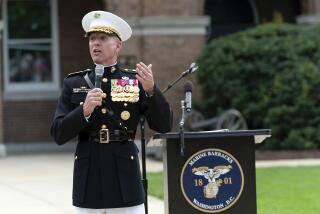Marine General Gives an Upbeat Report on Iraq
- Share via
CAMP PENDLETON — The top Marine Corps general in Iraq for the last seven months gave an upbeat assessment Monday of the U.S. mission in Iraq.
“I think in the west, we have broken the back of the insurgency,” said Lt. Gen. John F. Sattler, who as commanding general of the 1st Marine Expeditionary Force led Marines in the western portion of Iraq, including the so-called Sunni Triangle.
Sattler said he is encouraged by improvements in the Iraqi security forces. A year ago, he said, there were few if any competent Iraqi troops; now there are 5,000, with the number growing. Sattler spoke to several hundred Marines, and his comments drew cheers from the troops, many of whom had just arrived back at Camp Pendleton.
“They’re starting to stand tall, starting to take their future in their own hands,” he said. “They want to eliminate these thugs, murderers and intimidators.”
More than 41,000 Marines, sailors and airmen of the Camp Pendleton-based 1st Marine Expeditionary Force have been in Iraq since the middle of last year. For many, it was their second deployment there.
Many of them are now home and many more are on their way, as the 2nd Marine Expeditionary Force, based at Camp Lejeune, N.C., assumes responsibility for the region. Sattler was succeeded on Sunday by Maj. Gen. Stephen T. Johnson in a ceremony at Camp Fallouja, outside the city that Marines wrested from insurgent control during 11 days of combat in November.
Sattler, talking to reporters as well as the troops, said the Marines’ strategy in Iraq has been to convert as many insurgents as possible to helping rebuild Iraq, capture those who refuse to change and kill those who continue to try to kill Americans and their fellow countrymen.
“Often it’s an 18- or 19-year-old infantryman who has less than two seconds to make that decision: Is this person convertible or can I capture him, or do I have to kill them?” he said.
Sattler said the improvement of the Iraqi security forces has been remarkable, although other observers have been less optimistic, saying it would take the Iraqis years to provide adequate security. In the early months of the U.S. mission, Iraqi units were hurt by mass defections and lack of leadership.
“Once, we led and they watched,” Sattler said. “Then we were side by side. Now they are truly in the lead.”
Sattler rejected the idea that, by pulling troops into the hotspots of Fallouja and Ramadi, the Marines have deprived units along the Syrian border and the Euphrates River corridor of sufficient strength to combat smugglers and insurgents.
“We have sufficient forces to accomplish our mission,” he said.
More to Read
Sign up for Essential California
The most important California stories and recommendations in your inbox every morning.
You may occasionally receive promotional content from the Los Angeles Times.









